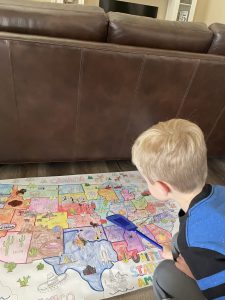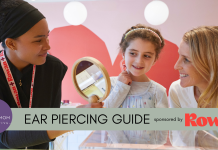An older, wiser person once told me they thought the world was a happier place when the only options at the ice cream shop were vanilla and chocolate. Back then, it didn’t take long to decide what sounded good and it didn’t leave much room for regret. Now when you go to an ice cream shop, there are dozens of choices. It’s difficult to decide which one sounds best and tempting to look around at others after you finally ordered and wonder if any other flavor would have been better.
I can’t help but see the parallel with our abundance of schooling options. In some parts of the country, your address dictates which school your children will go to unless you opt for a private school.
In the Denver area, however, we have a wide variety of school choices for our children. That sounds like a good thing but with many choices can easily come overwhelm. “Neighborhood school,” “Classical Academy”… We hear so many terms being tossed around and one can’t help but wonder what it all means.
My hope is to help you understand what the available options are, especially if you are new to the area or starting this adventure with your first kiddo, so that you can stand confidently in the choice you eventually make for your children.
There are three main categories of out-of-the-home school options and then there is the homeschooling option, which also has more possibilities than most realize.
Private School
Usually, private schools have been founded with some sort of value set or ideal that they want to be able to instill in their student body, often times religion but not exclusively, and parents like the idea of their children being in that environment. The most limiting factor to the private school option is cost because they charge tuition and fees. Cost can be prohibitive for some, but it is always worthwhile to do some research. Many private schools provide scholarships or tuition assistance for families that cannot pay the full price.
Some examples of private schools are Valor, Lutheran High School or Regis on the southeast side, Colorado Academy on the southwest side, Denver Jewish Day School in Arapahoe County or International School of Denver in Denver, to name just a few. A quick internet search of your particular part of town is sure to result in a list for you to explore to find one that matches your family well. It is a good idea to schedule a tour before you decide so you can physically see the school in action and ask any questions you might have.
Public (Neighborhood) School
In contrast to a private school, a public school is free of charge. They get their funding from the state of Colorado. With that can come some challenges like when budgets and funding are tight, district needs have to pass a vote by the district’s citizens, or a school has some limits to what they can or cannot do depending on state guidelines. However, positives include no tuition, free lunch, bus transportation (in most districts) and, in most cases, convenient proximity to your home.
In many districts, there is the additional option of open-enrolling students in different schools than the one officially zoned to a home if you so choose. There may be a waitlist if the particular school you want to open enroll at is at capacity, but it is a nice option to inquire about if you have your eye on a particular school. Keep in mind, though, that when open enrolling you will not have the option of using the bus. These public schools are often referred to as “neighborhood schools” to distinguish them from the other free, public option – charter schools.
Charter School
Charter schools are a public option because they receive state funding and are tuition-free. Oftentimes, they are also under the supervision of and accountable to our school districts. They are not zoned to certain neighborhoods and children from any address may attend. However, you will have to provide your own transportation. Similar to private schools, though, charter schools are usually founded upon some sort of belief or set of ideals they would like to instill in their students or emphasize in their curriculum. Perhaps they want to focus on STEM curriculum (Science, Technology, Engineering and Math), project-based learning, the performing arts, or a more traditional, classical education (a quick Google search can give you lots of information about what a classical education means).
Therefore, not every charter school is a good match to every family. It is important to do research and tour the school to see if it fits your children well. There is a wide variety of charter schools to consider, though! There is usually an application process to express your interest because their capacity is limited and waitlists can get long very early in the calendar year. Most schools’ enrollment windows begin in November, with a second round running from January on. However, many schools do see quite a bit of movement on their waitlists for a variety of reasons, so if you have your heart set on a certain school, it doesn’t hurt to go through the process and get on the list.
Also, there will be years when schools decide to expand and open new campuses, and it can be easier to get in later than usual to fill that new campus. Leman Academy of Excellence in Parker, for example, is opening a Bayou Gulch campus for the 2024-2025 school year. Many charter schools serve grades Kindergarten through 8th, which is an additional bonus for families with multiple children. The older grades often times have more openings, too.
Homeschool
In addition to all of the above options, there is also home education. Since the pandemic, homeschooling is growing rapidly. Many families realized there is more flexibility in the definition of “homeschool” than they knew pre-pandemic, and they found that it fit their families very well. With co-ops (groups of homeschoolers who get together for various purposes) and enrichment programs growing to meet the increasing need, even working parents have realized homeschooling can be a possibility.
In the traditional sense, homeschooling involves a parent (or both) choosing curriculum, planning lessons and teaching their children at home. This can be an overwhelming thought to many. And of course, the dreaded word “socialization” comes into play. But in 2024, those are becoming stigmas of the past. Many private schools have a homeschool enrichment program in which homeschool students go to the private school once a week to engage in Specials (Art, Music, PE, etc) and hands-on learning with peers. Quite a few of these programs also provide what is called an “umbrella program” where the school will take care of any state required testing and reporting to the local district and the children are considered students of that school where attendance is concerned.
These programs can help put a parent’s mind at ease about all the boxes that need to be checked. Southeast Christian School in Parker is one example. Some charter schools even have university model hybrid programs where homeschool students attend twice a week and paid staff teach the lessons from the school’s curriculum and assign the work to be completed on the students’ three days at home. Platte River Academy’s Classical Academy for Homeschoolers in Highlands Ranch is a great place to read more about that option.
These type of hybrid options provide families an opportunity to homeschool who may have at one point in time thought it impossible. Especially if they work nontraditional hours and can help their children with the at-home assignments when it works for them, it can become quite feasible to use these hybrid programs and have their children home a few days a week. Being at a school building once or twice a week opens up more options for parents who work from home or work part time to still enjoy the benefits and flexibility of homeschooling, and it also allows the children to gather with fellow homeschoolers and enjoy time with peers. Many gyms and recreational businesses also provide homeschool classes such as gymnastics, ninja or music during the daytime when they would otherwise not have business.
While there are now so many fun new ways to homeschool, there are still state requirements to think of and work to be done. Doing some research into the state requirements and the options near you will help you decide if homeschooling is a good route for you. The Colorado Department of Education website has a page for homeschool education that is a great place to start: Home School in Colorado | CDE (state.co.us)
With so many different ways to educate our children, it can seem impossible to know which one is right. The good news is there is no right or wrong! Every option has pros and cons. Do some research into schools near you that sound intriguing and go from there, one step at a time.
Also, don’t get overwhelmed by the thought that the first option you choose has to be your family’s path forever. For everything there is a season, right?! Circumstances change, kids change, and it’s OK for your educational choice to change, too. You’re not married to the first school you choose. So try not to look around and wonder if your neighbors made the better choice; perhaps you will choose differently later, or they will. And that’s OK.
It’s also completely acceptable to choose different schools for different children! In my family, my oldest is in our neighborhood middle school, but my younger two homeschool. Even within our own family the same school choice doesn’t fit every child. While a lot of options can get overwhelming, being able to fit each child or family to a school that’s just right for them is a wonderful benefit.












